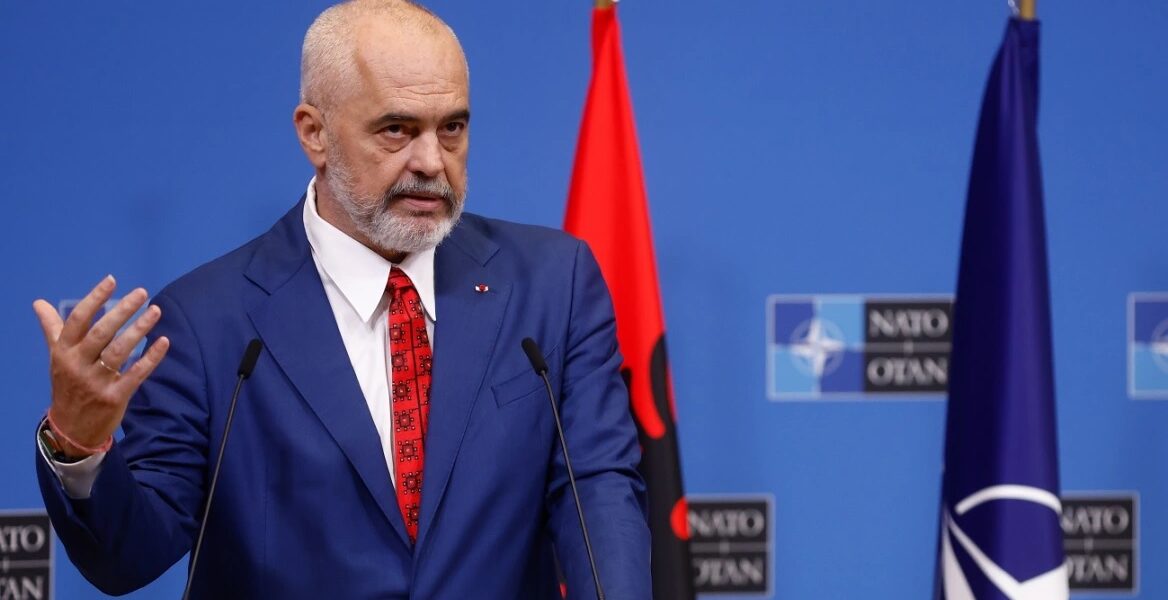Albanian Prime Minister Edi Rama, who will be the host of the EU-Western Balkans Summit today in Tirana and will meet with Greek Prime Minister Kyriakos Mitsotakis, gave an interview to EURACTIV leaving serious points against Athens.
In his interview, Rama spoke on the eve of the enlargement summit, regional tensions and the need to advance reforms to ensure the authenticity of the enlargement process.
“We should not forget that the integration process is an individual-based, merit-based process. We have to fulfil homework criteria standards, and it’s not an exam to be cheated. Even, even if the professors are very inclined to give you a way out. It’s in your best interest that you get this exam right,” Rama said.
He added that it is crucial to have working institutions and not to “cheat a lot as some neighbouring countries did in the past.” When asked to name names, Rama said, “Greece”.
The European perspective of Albania
Albania started accession negotiations in June 2022 and is set to begin the process of aligning its laws with the EU acquis.
However, there are many areas that require reform, such as the rule of law, corruption and media freedom, according to the European Commission’s latest progress report published in October.
Asked if he felt his government was to blame for slow progress in key areas, Rama admitted mistakes had been made.
“With hindsight, there are always things that could have been addressed better and there are always problems that could have been dealt with better, no doubt,” he said, adding that there are initiatives afoot to improve media freedom.
Tuesday’s summit will take place amid protests led by former prime minister and president Sali Berisha who accuses the Rama government of corruption and driving and doing nothing to prevent mass emigration.
As for the summit, Rama believes that the fact it is being held outside of Brussels and in a non-EU country, speaks volumes about the current situation in Europe and a renewed appetite for enlargement.
“Just the fact that we have a summit in Tirana – who could imagine just a few years ago, that the EU would get out of its perimeter, and the Council would move in a non-EU country to have a summit. And it’s not just a manifestation, an event, it’s more than that. It’s a commitment, it’s a message,” he said.
For all these reasons, although the EU has become much more committed to the concept of enlargement, Rama is less convinced when it comes to actual integration.
“I believe it’s more than just nice words, in terms of the genuine interest now, but will the general interest transform into action? And will the action be sufficient? I don’t know.”
Rama continued that while support from Germany is not unexpected as Berlin has “for a long, long time been very committed,” he said the recent supportive stance of France is a “surprise”.
“France is a surprise as it has never been so in the past. It has suddenly understood the region’s strategic importance. And it’s the credit of the French president who from the beginning to now has changed a lot in terms of the depth of understanding of this region,” he said.
Earlier this year, French President Emmanuel Macron mooted the idea of a European Political Community bringing together member states, EU candidate countries, and hopefuls. The first meeting was held in early October.
“Now, this is a very new thing, and it’s all to be seen and tested…We need to get together beyond the perimeter of the European Union. Because these other countries may not be in our union, and may not be eligible to be part of this union for different reasons, but they are Europeans,” said Rama.
Prime Minister Kyriakos Mitsotakis is visiting Albania on Tuesday and Wednesday, accompanied by Foreign Minister Nikos Dendias and the Deputy Foreign Minister Kostas Fragogiannis.
On Tuesday, Mitsotakis will participate in the proceedings of the EU-Western Balkans summit in Tirana, as it is the first time that such a summit is hosted in a country candidate for joining the European Union.
After the end of the summit, Mitsotakis will have bilateral meetings with the Albanian leadership and more specifically with his counterpart, Edi Rama, the President of the Republic, Bajram Begaj and the President of the Parliament, Lindita Nikolla.
Before the bilateral meetings with the Albanian leadership, the prime minister will have a meeting with the Archbishop of Tirana, Durres and all Albania, Anastasios.
According to government sources, Greece supports Albania’s European perspective and seeks to improve bilateral relations with the neighboring country.
READ MORE: Turkey celebrates “Turkish Coffee Day” with a tweet in Greek – Watch the video.

